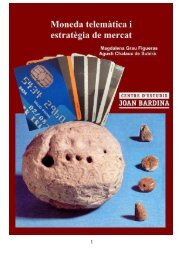Telematic currency and market strategy (mtemuk.pdf). - Centre d ...
Telematic currency and market strategy (mtemuk.pdf). - Centre d ...
Telematic currency and market strategy (mtemuk.pdf). - Centre d ...
Create successful ePaper yourself
Turn your PDF publications into a flip-book with our unique Google optimized e-Paper software.
A. Money systems until now.<br />
Chapter 1. Limiting the matter being studied.<br />
1. Goals <strong>and</strong> method of this chapter.<br />
2. Historical context.<br />
3. Geo-political context.<br />
4. Conclusions.<br />
1. Goals <strong>and</strong> method of this chapter.<br />
The critical consideration on the money systems is the core of this essay. But before starting we want to use<br />
this chapter to situate the money systems within the global context where they will be studied <strong>and</strong> to fix<br />
exactly their limits.<br />
This job will help also to give the definitions of the main technical wording which will be used in this essay.<br />
The more specialized terms will be defined every time it becomes necessary.<br />
2. Historical context.<br />
Money systems appear under given historical conditions which we should remember. Therefore, they must be<br />
considered as the results of a lasting evolution, or better still, of a utilitarian evolution of mankind. All living<br />
beings, among them man, need a number of commodities in order to develop <strong>and</strong> better work out their<br />
existential process. These commodities will be indicated as utilitarian commodities, so as to show that they<br />
are useful to satisfy the material needs of human beings. As a definition, all utilitarian commodities have a<br />
<strong>market</strong> value which is subjective, that is depending from the subject who is their user.<br />
The word utilitarianism will indicate any production <strong>and</strong> distribution system of utilitarian commodities<br />
within every community under consideration.<br />
In historic times, several sorts of utilitarianism have followed each other in mankind, which we will describe<br />
shortly.<br />
• 1. Pre-exchange utilitarianism: it is the most primitive utilitarian system, <strong>and</strong> is determined by the fact<br />
that the production of utilitarian goods by the human group under consideration is fully distributed<br />
within the group itself, without any exchange, only a redistribution. The producer subject -who<br />
usually is not one individual, but rather all the community- is the end-user of the goods.<br />
• 2. Exchange utilitarianism: from a given point of historical development, human communities<br />
exchange the utilitarian goods produced, both within themselves <strong>and</strong> with other communities.<br />
Therefore the goods obtain a new value: the exchange value, which is subjective twice, because it<br />
depends from the subjective evaluation of the two exchange agents. As a synonym of «exchange<br />
utilitarianism» we will use the word <strong>market</strong>, <strong>and</strong> as a synonym of «exchange utilitarian goods» we will<br />
currently say «goods» or «merch<strong>and</strong>ise».<br />
o 2.1. Pre-<strong>currency</strong> exchange utilitarianism or non-money <strong>market</strong>:in the first place, exchange of<br />
goods is effected intuitively, according to the needs of the exchange agents, but without any<br />
reference to any objective model of the exchange value, that is without any reference to any<br />
sort of money units.<br />
o 2.2. Money exchange utilitarianism or money <strong>market</strong>: starting from a given historical<br />
moment -which probably we can locate at the beginning of what is called «neolithic<br />
transformation»- exchange of goods is effected according to some regulating conventions or<br />
st<strong>and</strong>ards of the exchange value of the goods, which we will call money units. The reference<br />
to a value st<strong>and</strong>ard finally transforms exchange into an objective act.<br />
The conclusions to this might therefore be the following:<br />
8



